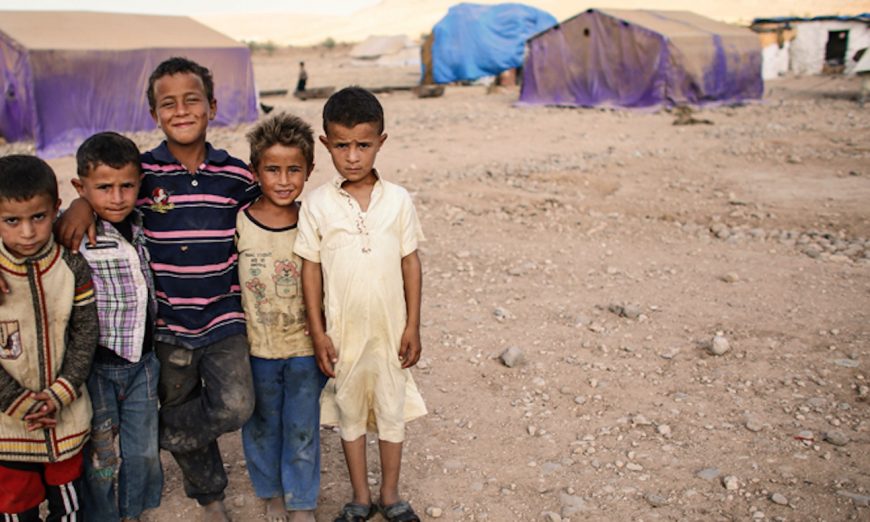World Refugee Day prompts more pondering about refugee issues
HRAA’s Secretary General Salih Efe: Turkey’s new “Foreigners and International Protection Draft Bill” is a milestone in refugee issues despite some deficencies.
To mark World Refugee Day on June 20, the Coordination for Refugee Rights (CRR) released a report in which figures indicate a striking increase in the number of refugees in Turkey, prompting a debate on the resolution of Turkey’s long-standing refugee issues.
The report reveals that 2011 saw a 74 percent of increase in the number of refugees in Turkey, the most rapid increase in refugees seen in the last 10 years.
The increase of refugees in Turkey is closely related to the escalating violence and conflicts in the Middle East and nearby, as most of the refugees taking shelter in Turkey are from Iraq, Iran, Afghanistan and Somalia. In addition, the number of Syrians who have fled the ongoing violence in their country and sought refuge in Turkey reached 29,411 on June 14.
Yet the figure of 74 percent does not include Syrian refugees in Turkey, as these refugees are not registered with the UN and they do not have legal status.
Turkey still maintains it has a “geographical limitation” concerning its application of the UN’s 1951 Convention relating to the Status of Refugees. By doing so, Turkey holds that it is not obligated to recognize individuals coming from outside of Europe as refugees. Thus people arriving in Turkey from a country outside of Europe are not given refugee status and are simply labeled “asylum-seekers,” which denotes that they are being accommodated in Turkey for a limited time only until they obtain more permanent asylum from a third country. This is why Syrians seeking protection, for whom Turkey has recently formally established a temporary protection regime, cannot be officially considered refugees in Turkey — hence the term “guests” used by the Turkish authorities. However, many national and international human rights organizations are calling on Turkey to lift its geographical limitation, which blocks access for the asylum seekers to international humanitarian protection.
Another target of criticism is that some national and international delegations have not been allowed to enter Turkey’s refugee camps as the authorities cite the refugees’ safety and privacy as grounds for refusing entry to journalists, official delegations and representatives of NGOs.
Attorney Salih Efe, a legal officer at the European Court of Human Rights (ECtHR) in France and the UN High Commissioner for Refugees (UNHCR) in Turkey, said that the living standards of the Syrian refugee camps in the Hatay province are reported to have been raised significantly, but this remains speculation unless observers can go there and see it for themselves. Suggesting that refugee camps should be open to civilian oversight and observation patrols, Efe said: “This issue with the Syrian refugees — as well as other refugees — does not only concern the state. This is an issue about human beings and it is the responsibility of all of us. The refugees’ situation should be rendered more transparent and NGOs and civilians should be allowed to observe and even contribute to refugees’ issues and needs.”
As a positive step regarding refugee conditions, the Interior Ministry has prepared a law titled “Foreigners and International Protection Draft Bill,” aiming to ensure better living standards and greater protections for refugees. The bill fleshes out the previously insufficient legal framework and makes numerous improvements to both migrant and refugee statuses. “It is undeniably a positive step, but far from satisfactory,” Pırıl Erçoban, administrative coordinator of the Association for Solidarity with Refugees (MDD), has said.
“It is true that the bill will raise the standards of refugees’ living conditions significantly. However, the bill does not commit to resolving the issues of the difficulty of gaining international protection status or the long and complicated process for asylum-seeker and refugee applications. For example, asylum seekers are required to submit their application within 10 days after entering the country and to provide an official identity document within 15 days. This is too short a period of time and moreover if the applicant leaves the province he or she is in within these 15 days, the application is canceled automatically. And the new draft bill promises no significant change on this issue,” Erçoban explained.
Yet, there are also positive sides of this bill, Erçoban said, referring to the articles that make it clear that refugees that face threats to their lives in their own countries won’t be forced to return to their countries, thereby ensuring security for the refugees.
Efe described the draft bill as a milestone in Turkey’s negotiation of refugee issues. “This is the first serious step Turkey has taken in its republican era for those who had to leave their home countries as they face threats there. Before this draft bill, this [the refugee security issue] was an issue that was handled simply with directives. Critical human rights violations were being committed in Turkey before, but with the establishment of many NGOs and with attorneys gaining more awareness about refugee issues and problems in recent years, their issues have come to the surface more. Of course there are still some deficiencies in the draft bill. But when those deficiencies are handled with a new bill in the future, that will be another milestone. Yet, for now, we should celebrate the improvements this bill promises.”
Efe argued that the approach and perception towards refugees need a fundamental change. “We have a tendency to perceive refugees as strangers or even aliens. However, our history and cultural background show a great example of embracing different cultures and nations. Our roots suggest tolerance and love for one another. Comparing with the past, improvements in people’s perception have been seen. But still more efforts should be given to raise such an awareness to raise this embracing attitude towards refugees, that are our guests after all.”
By Merve Büsra Öztürk , Today’s Zaman.
http://www.todayszaman.com/newsDetail_getNewsById.action?newsId=284445
24 June 2012, Today’s Zaman, Istanbul.

